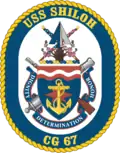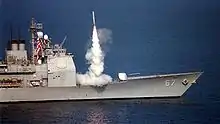USS Shiloh (CG-67)
USS Shiloh (CG-67) is a Ticonderoga-class guided missile cruiser of the United States Navy, named in remembrance of the Battle of Shiloh during the American Civil War. She was built at the Bath Iron Works in Bath, Maine.
 USS Shiloh (CG-67) | |
| History | |
|---|---|
| Name: | Shiloh |
| Namesake: | Battle of Shiloh |
| Ordered: | 16 April 1987 |
| Builder: | Bath Iron Works, Bath, Maine |
| Laid down: | 1 August 1989 |
| Launched: | 8 September 1990 |
| Acquired: | 24 April 1992 |
| Commissioned: | 18 July 1992 |
| Homeport: | Yokosuka, Japan |
| Identification: |
|
| Motto: | Making Excellence a Tradition |
| Status: | in active service |
| Badge: |
 |
| General characteristics | |
| Class and type: | Ticonderoga-class cruiser |
| Displacement: | Approx. 9,600 long tons (9,800 t) full load |
| Length: | 567 feet (173 m) |
| Beam: | 55 feet (16.8 meters) |
| Draft: | 34 feet (10.2 meters) |
| Propulsion: |
|
| Speed: | 32.5 knots (60 km/h; 37.4 mph) |
| Complement: | 30 officers and 300 enlisted |
| Sensors and processing systems: |
|
| Armament: |
|
| Aircraft carried: | 2 × Sikorsky SH-60B or MH-60R Seahawk LAMPS III helicopters. |
With her guided missiles and rapid-fire cannons, she is capable of facing and defeating threats in the air, on or under the sea, and ashore. She also carries two Seahawk LAMPS multi-purpose helicopters, mainly for anti-submarine warfare, (ASW).
History
1990s
On 3 September 1996, while in the Carl Vinson carrier battle group, Shiloh launched six Tomahawk cruise missiles in Operation Desert Strike against Iraq.

2000s
She deployed with the Battle Group again in July 2002, and was among the first cruisers to launch missiles in Operation Iraqi Freedom. In March 2003 Shiloh was assigned to Cruiser-Destroyer Group Three.[1] The Shiloh returned to her homeport San Diego, California on 25 April 2003, ending an unusually long nine-month deployment.
In January 2005, she participated in Operation Unified Assistance, rendering aid to those who suffered from the 26 December 2004 tsunami off the coast of Aceh, Indonesia. Shiloh was one of the first American ships to arrive on scene.
On 22 June 2006, a Standard Missile Three (or SM-3) launched from Shiloh intercepted a multi-stage ballistic missile launched from the Pacific Missile Range Facility at Barking Sands, Hawaii.[2]
In August 2006, she arrived on station at Yokosuka Naval Base in Yokosuka, Japan, replacing USS Chancellorsville, as part of a joint U.S.-Japanese ballistic missile defense program.[3]
On 8 July 2009, Petty Officer 1st Class Christopher Geathers fell from the ship's fantail into Tokyo Bay while rigging shore power cables. A two-and-a-half-day search failed to locate Geathers and he was declared missing and later was declared dead.[4] A Navy investigation, led by Rear Admiral Kevin Donegan, commander of Task Force 70, found that the accident was preventable, in part because Shiloh personnel had observed Geathers working without proper safety equipment, but had failed to intervene. Nevertheless, the report did not recommend disciplinary action against any of the ship's crewmembers.[5]
2010s
In June 2017, a gas turbine systems technician named Peter Mims thought to have been lost at sea was found after seven days hiding in the engine room.[6][7] Following the Mims incident, several sailors contacted the Navy Times about severe morale problems on the ship to which they attributed the Mims incident. The Navy Times requested "command climate surveys" through a Freedom of Information Act request.
These surveys, completed voluntarily by sailors on the ship, reported extensive morale problems universally blamed on the CO, Captain Adam M. Aycock. Among the complaints were widespread depression and suicidal tendencies, a dysfunctional ship that sailors felt was ill-prepared for combat, an overworked and deeply stressed crew, and a constant worry of extreme punishment for minor infractions. Sailors were dismayed that despite a significant number of the ship's crew filing severely critical complaints of Aycock's leadership in the command climate surveys, the only action taken by the Navy was to counsel him. Capt. Aycock was relieved of command after completing his full 26-month tour.[8] [9]
2020s
In 2020, a US Navy budget plan proposed putting Shiloh, as well as her sisters USS Monterey, USS Port Royal, and USS Vella Gulf, on a path to early decommissioning, as they had not been modernized.[10]
In December 2020 the U.S. Navy's Report to Congress on the Annual Long-Range Plan for Construction of Naval Vessels stated that the ship was planned to be placed Out of Commission in Reserve in 2024.[11]
In popular culture
- The ship is featured prominently in the 2012 naval thriller, Fire of the Raging Dragon, by Don Brown.
References
- "World Navies Today: US Navy Aircraft Carriers & Surface Combatants". Retrieved May 2012
- "A Standard Missile Three (SM-3) is launched from the guided missile cruiser USS Shiloh (CG 67)". U.S. Navy. 22 June 2006. Retrieved 3 April 2010.
- https://news.yahoo.com/s/nm/20060829/wl_nm/arms_japan_usa_dc_2 Archived 1 September 2006 at the Wayback Machine
- Slavin, Eric, "Navy calls off search for USS Shiloh sailor", Stars and Stripes, 13 July 2009.
- Slavin, Erik, "Report: Sailor’s overboard death was preventable", Stars and Stripes, 6 January 2010.
- Cohen, Zachary US Navy loses sailor on ship for 7 days June 17, 2017 CNN Retrieved June 17, 2017
- Ziezulewicz, Geoff (30 December 2017). "How Peter Mims spent a week hiding in a warship's engine room (EXCLUSIVE)". Navy Times. Retrieved 2 January 2018.
- Geoff Ziezulewicz,'I now hate my ship’: Surveys reveal disastrous morale on cruiser Shiloh", "Navy Times", October 11, 2017.
- Geoff Ziezulewicz,'USS Bread and Water': Old and rare punishment loomed over a demoralized crew, "Navy Times", October 11, 2017.
- Eckstein, Megan (10 February 2020). "Navy's New Shipbuilding Plan 'Dead on Arrival,' Lawmakers Say". Retrieved 27 May 2020.
- "Report to Congress on the Annual Long-Range Plan for Construction of Naval Vessels" (PDF). Office of the Chief of Naval Operations. 9 December 2020. p. 16. Retrieved 2 February 2021.
This article includes information collected from the Naval Vessel Register, which, as a U.S. government publication, is in the public domain.
External links
| Wikimedia Commons has media related to USS Shiloh (CG-67). |
- Official Homepage
- Yokosuka Naval Base Community Website
- USS Shiloh webpage
- Maritimequest USS Shiloh CG-67 Photo Gallery
- An article: Shiloh sailors make star wars fan film
- USS Shiloh News
- Yarnall, Paul R.; Tom Bateman (25 January 2010). "USS Shiloh (CG 67)". NavSource Naval History. Retrieved 3 April 2010.
- "USS Shiloh (CG 67)". Naval Vessel Register. NAVSEA Shipbuilding Support Office (NAVSHIPSO). 8 August 2007. Retrieved 3 April 2010.